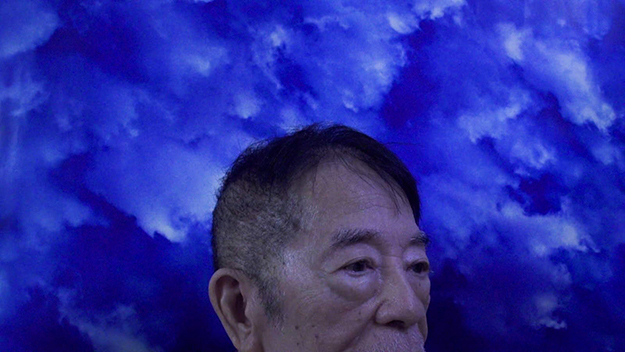Nothing but Blue Skies: Toronto 2023
This article appeared in the September 21, 2023 edition of The Film Comment Letter, our free weekly newsletter featuring original film criticism and writing. Sign up for the Letter here.

Nowhere Near (Miko Revereza, 2023)
Miko Revereza’s Nowhere Near, which made its North American premiere at this year’s Toronto International Film Festival, begins with a citation from author Roberto Bolaño: “I’d lost a country but won a dream.” These words, written by an artist whose homeland, Chile, was consumed by a military coup and subsequent dictatorship, resonate with Revereza’s filmic reveries on numerous levels. Born in Manila and raised in the U.S. as an undocumented migrant, Revereza has lived something of a stateless existence for much of his life. In Nowhere Near, as he leads us on an autobiographical journey through various cities and countries—all while reflecting on his sense of displacement, his heritage and family, and the impact of colonialism on the Philippines—we sense the melancholy of a life in which things are perpetually lost to the endless process of uprooting. At one point, Revereza shares snapshots of his parents in which faces have been carved away to be repurposed as passport photos.
But the dream to which Bolaño refers is equally alive in the way Revereza sublimates his experiences into cinema. Distances dissolve in the elegant superimposition of one place onto another. Time is elided and expanded through the precise use of edits. Languages blend together through the development of “loan words,” heard in Tagalog’s incorporation of Spanish. In its international scope, extensive timeline, and seductive lyricism, Nowhere Near takes the arresting intimacy of Revereza’s earlier feature, the diaristic railway travelogue No Data Plan (2019), to new, rapturous places. In particular, the opening and closing passages of Nowhere Near are as inviting, transporting, and beautiful as anything I saw at this year’s TIFF. At an event with no shortage of grandiose spectacle, Revereza’s itinerant search for an identity tethered to family and place felt like an alluring whisper.
While workers’ strikes may have tempered the hoopla that typically surrounds tentpole screenings at TIFF, it was pleasing to witness the palpable excitement generated by a new work from one of the city’s veteran auteurs (despite the absence of the film’s American star). Atom Egoyan’s Seven Veils stars Amanda Seyfried as Jeanine, a director charged with remounting a production of Strauss’s opera Salome originally staged by her deceased mentor, who extracted fraught elements of Jeanine’s childhood to service his vision. Egoyan has a penchant for conceiving labyrinthine dramatizations of trauma, loss, and troubled legacies both familial and cultural, animating characters in a manner that can strain credibility when framed within a realist mode. Seven Veils is as thematically ambitious as anything Egoyan has ever made, yet it embraces a sense of disorder and mystery that persists even after its ostensible resolution. It’s Egoyan’s best film in a quarter-century.
Seven Veils was made in collaboration with the Canadian Opera Company, though the organization’s name is never explicitly spoken in the film—an understandable omission given the story, which involves behind-the-scenes abuse and systematic enablement. Egoyan’s celebrated work as an opera director infuses his latest effort with the gravitas of lived artistic experience. The filmmaker’s long-standing fascination with technological mediation emerges through a series of video calls, where what is and isn’t in frame creates an engrossing tension, as well as through the use of video projection and shadow play in Jeanine’s production of Salome—devices that only heighten the ambiguities of desire and compliance offstage. Still, for all the film’s audiovisual interventions, its most impressive aspect is Seyfried’s performance. Her bold choices, especially in scenes where Jeanine seems nearly as confused about personal boundaries as her mentor was, radiate emotional intelligence.
Though it presents as a brooding noir procedural, Grant Singer’s fiction feature debut, Reptile, is also a film whose greatest strengths lie in its myriad narrative puzzles and nuanced lead performance. The movie stars Benicio Del Toro as Tom Nichols, a homicide detective recently transferred to Scarborough, Maine following a police department scandal in his former home base of Philadelphia. Tom leads an investigation into the murder of a realtor, a case in which the victim’s boyfriend and colleague (Justin Timberlake) is just one of several suspects. The real estate market and the politics of home renovation are key themes of Reptile, manifesting in an array of locations riddled with allusive decorative details, none of which are lost on Tom, who becomes bizarrely fixated on a touchless faucet. Tom’s ostentatious interest in luxury kitchen appliances is matched in peculiarity by his love of square dancing and off-color jokes, but it is very much to Reptile’s benefit that Del Toro, who is also credited as a co-writer, resists emphasizing his character’s eccentricities. Instead, he opts for a coolness verging on deadpan, which only makes us lean in more closely and question our allegiances.
Another actor who seems to have a transformative impact on most of the films in which he’s cast, Alfredo Castro greatly enhances A Ravaging Wind, the latest from Argentine director Paula Hernández. The film is based on a novel by Selva Almada, yet its unusual fusion of road movie and chamber drama lend it the feeling of a theatrical adaptation. When their car breaks down in a remote region of Argentina, Pearson (Castro), a traveling Protestant minister, and his daughter find themselves passing a long, hot day and night with a backwoods mechanic (Sergi López) who resides with his disabled teenage son and countless dogs in a rust-encrusted shack. There is a writerly symmetry to the story’s pairing of single fathers raising children on the cusp of emancipating themselves from familial constraints, but the more awkwardly artificial aspects of A Ravaging Wind are pleasingly counterbalanced by Hernández’s beautiful evocation of place and period—the film seems to be set some decades in the past—and her excellent actors, all of whom deftly evade simplistic readings of characters caught in an obvious clash of values. Above all, Castro does something remarkable with Pearson’s passion: the character could easily become caricature, with his incessant benedictions and showy, knee-jerk eagerness to share his stories and solicit those of others. But Castro, rigorously focused on actions rather than on transmitting intentions or attitudes, renders the pastor as a man genuinely caught up in his mission—so much so that he prizes connecting with parishioners above teaching his own daughter to take control of her life in the face of rapidly approaching adulthood.
José Teodoro is a critic, multidisciplinary artist, and co-founder of the band Applied Silence.







